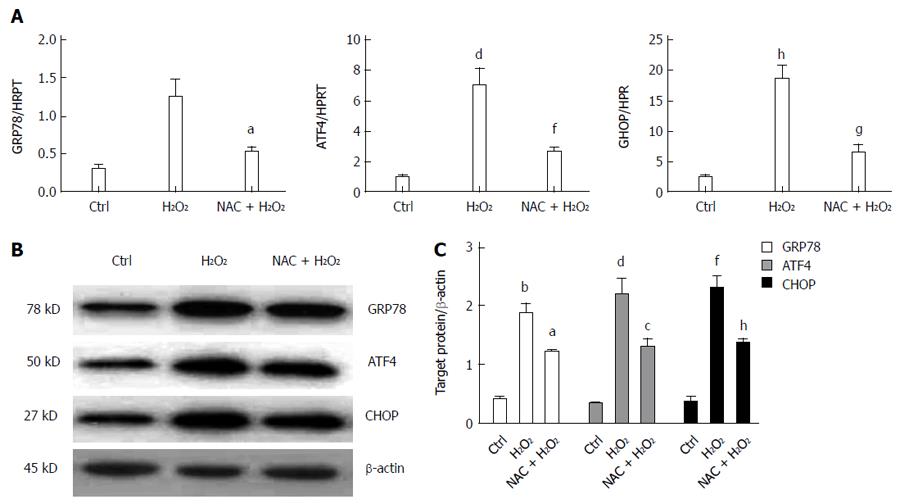Copyright
©2014 Baishideng Publishing Group Inc.
World J Gastroenterol. Nov 7, 2014; 20(41): 15289-15298
Published online Nov 7, 2014. doi: 10.3748/wjg.v20.i41.15289
Published online Nov 7, 2014. doi: 10.3748/wjg.v20.i41.15289
Figure 4 Reactive oxygen species-mediated endoplasmic reticulum stress is inhibited by N-acetylcysteine treatment in vitro.
A: Endoplasmic reticulum stress related gene (GRP78, ATF4 and CHOP) expressions in primary hepatocytes harvested 3 h after H2O2 treatment by quantitative real-time reverse transcriptase polymerase chain reaction analysis; mean ± SD, n = 3-5/group, bP < 0.01, dP < 0.01, hP < 0.01 vs Ctrl group; aP < 0.05, fP < 0.01, gP < 0.05 vs NAC + H2O2 group; B: western blot-assisted analysis of GRP78, ATF4, CHOP and β-actin; C: Relative quantities of protein of GRP78, ATF4 and CHOP, mean ± SD, n = 3-5/group, bP < 0.01, dP < 0.01, fP < 0.01 vs Ctrl group; aP < 0.05, cP < 0.05, hP < 0.01 vs NAC + H2O2 group; representative of three experiments. NAC: N-acetylcysteine; IR: Ischemia-reperfusion; Ctrl: Control.
- Citation: Sun Y, Pu LY, Lu L, Wang XH, Zhang F, Rao JH. N-acetylcysteine attenuates reactive-oxygen-species-mediated endoplasmic reticulum stress during liver ischemia-reperfusion injury. World J Gastroenterol 2014; 20(41): 15289-15298
- URL: https://www.wjgnet.com/1007-9327/full/v20/i41/15289.htm
- DOI: https://dx.doi.org/10.3748/wjg.v20.i41.15289









